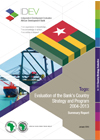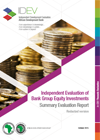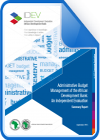
This Country Strategy and Program Evaluation aims at: (i) assessing the development results achieved through the assistance provided by the African Development Bank Group (“the Bank” or “AfDB”) to Ethiopia, and in particular the extent to which the Bank’s interventions made a difference and how, and (ii) drawing lessons on how the Bank manages its interventions in the country with the aim of suggesting potential improvements to inform the preparation of the new Country Strategy Paper (CSP) for Ethiopia.
This evaluation assessed the Bank’s development assistance to Tanzania during the period 2004-2013. It covered three Country Strategy Papers (CSPs): 2002-2004/5, 2006-2010 and 2011-2015. The evaluation will inform the new CSP2016-2020 and provide inputs to the Comprehensive Evaluation of the Bank’s Development Results (CEDR).
As a key component of the Comprehensive Evaluation of the African Development Bank’s Development Results (CEDR), this evaluation measures the relevance, effectiveness, sustainability and efficiency of Bank Group assistance to Senegal over the period, as well as the institutional performances of the Borrower and the Bank between 2004 and 2013. The Government, civil society and the other actors concerned hope to learn lessons that will be reflected in the design and smooth implementation of the Bank's 2016-2020 Country Strategy Paper (CSP) for Senegal.

This document summarizes the principal findings of the evaluation of the African Development Bank’s 2004-2013 strategy in Togo. The evaluation was initiated and carried out by the Bank’s Independent Development Evaluation (IDEV). Methodologically speaking, the evaluation is structured around 18 questions. It also specifically addressed questions of fragility by including an analysis of Togo’s fragility, how the Bank’s strategies took fragility into account, and how these have contribute to changes in the factors that create fragility.

This report presents the findings of an evaluation of the Bank Group’s Equity Investments. This evaluation was conducted in order to inform Bank’s decisions on the future use of equity investments by identifying lessons and potential areas for improvement. As such, the purpose of the evaluation is two-fold: 1) assess the relevance and performance of the Bank’s equity investments; and 2) identify lessons, recommendations and areas for improvement.

This summary report presents the results of an independent evaluation of the efficiency and effectiveness of the African Development Bank’s administrative budget management. The evaluation’s overarching objective was to assess the extent to which the management of the Bank’s administrative budget provides efficiency and effectiveness in delivering on its strategic priorities and areas where further improvements may be possible. The evaluation also assessed the extent to which key actions recommended by the 2012 review of budget reform had been implemented.